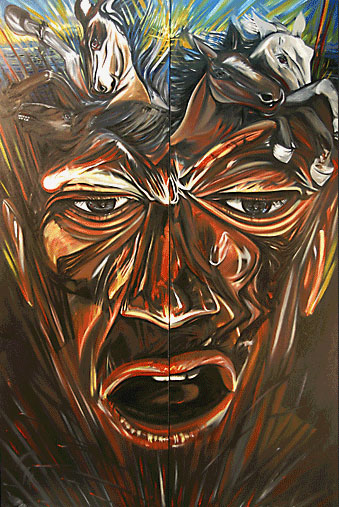Helios
The Greek God (also associated to Hyperion or as the son of Hyperion), crowned with the shining aureole of the sun. Brother of the Goddesses Selene (the moon) and Eos (the dawn). Represented driving a chariot of the sun across the heavens each day; identified by the Romans as Sol.
In the greater sextych, Helios catches the glow of the 'second coming' from the explosion going off in his face; the explosion below is also akin to the suddenness of daybreak, the authority of the sun over the Earth.
In the individual diptych, he is represented as a Palestinian 'martyr' whose bomb has gone off in his face. Unleashed passion is often that which destroys but also which is sometimes necessary for a culture's survival. In the classical myth, Helios’ "fire-darting steeds" (Pyrios, Aeos, Aehton, and Phlegon) represent unreasoned passion: unbridled, and mad with fear and hatred.
Hubris, though not specifically defined, was a legal term and was considered a crime in classical Athens. It was also considered the greatest sin of the ancient Greek world, because it was not only proof of excessive pride, but also resulted in violent acts by—or to—those involved. The category of acts constituting hubris for the ancient Greeks apparently broadened from the original specific reference to the mutilation of a corpse, to the a humiliation of a defeated foe, or to irreverent "outrageous treatment" in general.
The meaning was eventually further generalized to its modern English usage to apply to any outrageous act, exhibition of pride, or disregard for basic moral laws. Such an act may be referred to as an "act of hubris", or the person committing this act may be said to be hubristic. Ancient Greek for "ruin, folly, delusion," the action performed by the hero—usually because of his/her hubris, or great pride—leads to his/her death or downfall.
Unfortunately faith, resolve and dogma can lead to atrocities and catastrophes as the Crusades, Inquisition, Holocaust and Fanatic Islamism prove. It takes little for self-confidence to become hubris or chutzpah, as for money to become an obsession from means and power to become an addiction from intoxication.
Gaurang Bhatt, MD (January 9, 2005)
Dawn / Stratosphere
The Greek God (also associated to Hyperion or as the son of Hyperion), crowned with the shining aureole of the sun. Brother of the Goddesses Selene (the moon) and Eos (the dawn). Represented driving a chariot of the sun across the heavens each day; identified by the Romans as Sol.
In the greater sextych, Helios catches the glow of the 'second coming' from the explosion going off in his face; the explosion below is also akin to the suddenness of daybreak, the authority of the sun over the Earth.
In the individual diptych, he is represented as a Palestinian 'martyr' whose bomb has gone off in his face. Unleashed passion is often that which destroys but also which is sometimes necessary for a culture's survival. In the classical myth, Helios’ "fire-darting steeds" (Pyrios, Aeos, Aehton, and Phlegon) represent unreasoned passion: unbridled, and mad with fear and hatred.
Hubris, though not specifically defined, was a legal term and was considered a crime in classical Athens. It was also considered the greatest sin of the ancient Greek world, because it was not only proof of excessive pride, but also resulted in violent acts by—or to—those involved. The category of acts constituting hubris for the ancient Greeks apparently broadened from the original specific reference to the mutilation of a corpse, to the a humiliation of a defeated foe, or to irreverent "outrageous treatment" in general.
The meaning was eventually further generalized to its modern English usage to apply to any outrageous act, exhibition of pride, or disregard for basic moral laws. Such an act may be referred to as an "act of hubris", or the person committing this act may be said to be hubristic. Ancient Greek for "ruin, folly, delusion," the action performed by the hero—usually because of his/her hubris, or great pride—leads to his/her death or downfall.
Unfortunately faith, resolve and dogma can lead to atrocities and catastrophes as the Crusades, Inquisition, Holocaust and Fanatic Islamism prove. It takes little for self-confidence to become hubris or chutzpah, as for money to become an obsession from means and power to become an addiction from intoxication.
Gaurang Bhatt, MD (January 9, 2005)
Dawn / Stratosphere
© Copyright 2016 Jeffrey A’Hearn

